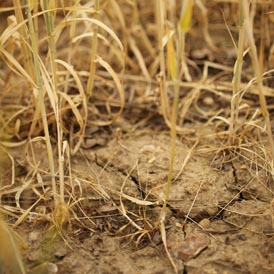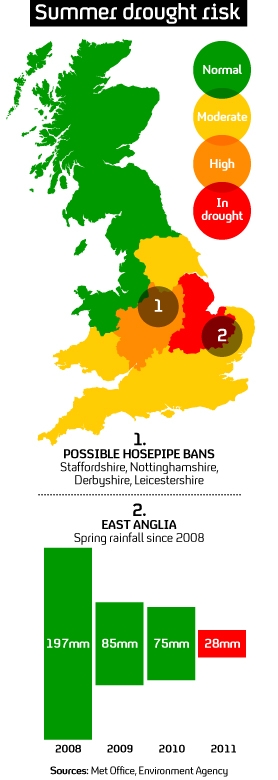Driest spring on record triggers drought alert
As a state of drought is officially declared in some parts of England, one farmer tells Channel 4 News he has already had restrictions placed on him and that his crops are “desperate for rain”.

The announcement comes amid fears of hosepipe bans in Staffordshire, Nottinghamshire, Derbyshire and Leicestershire, along with low rivers levels and very dry soil.
Severn Trent Water has already warned customers they may face restrictions unless there is a quick return to normal levels of rainfall.
Cambridgeshire, Northamptonshire and Lincolnshire are now officially suffering from drought, while parts of the South West, South East, Midlands and Wales are experiencing near-drought conditions, the Department for Environment, Food and Rural Affairs (Defra) said.
Marc Heading, a farmer in Chatteris Cambridgeshire, has already received a letter telling him irrigation is banned in certain areas.
Read more: Drought fears after warmest April on record
He told Channel 4 News his crops are desperate for rain: “We’re fortunate in that we’ve got some water in reservoirs that were filled up in the winter time but that is only giving us probably a third of what we’re likely to want.
“Unless we get more rain from up above then we’re going to be very short of water for irrigating crops over the next couple of months.”

Consumers warned use water ‘wisely’
In the affected areas, Anglian Water and Cambridge Water have insisted there is no threat to the public water supply and that they have enough to get through the summer.
Anglian Water’s Media Manager John Clare told Channel 4 News they were in a “healthy position” and there would “not be a hosepipe ban in the Anglian Water region this summer”.
Environment Secretary Caroline Spelman also had a reassuring message for the public.
“Water companies are confident that supplies are high enough so that widespread restrictions to the public are unlikely.
“We’re doing all we can to reduce the impact on agriculture and wildlife, but everyone can play their part.
“Households know how to use less water and everyone can do their bit to use water more wisely, not only through the summer, but throughout the year.”
Environment Agency chief executive Dr Paul Leinster said there were “plans in place” to ensure there is enough water for people, businesses and the environment.
Impact on food prices
Mrs Spelman is set to hold a second drought summit to review the impacts of the continuing dry weather. Defra’s announcement comes as the Centre for Ecology and Hydrology (CEH) indicated that provisional data showed England had experienced its driest May according to records dating back 100 years.
Ahead of the publication of the latest monthly assessment of rainfall, river and water levels, experts also said that by late May soils in large parts of eastern and central England were at their driest on record.
But National Farmers’ Union economist Clare Rowntree said the issues, affecting swathes of arable agricultural areas in the east of the country, would not have a large impact on food prices.
However, livestock farmers would be concerned by the potential increase in feed costs, while farmers in areas affected by water shortages would have to buy in more feed to make up for fodder crops which suffered from poor yields, she said.
According to the CEH, the biggest impact of the continuing dry conditions is in rivers, with waterways across much of southern Britain close to or at their lowest levels for this time of year.
-
Latest news
-
US campus protest arrests ‘very upsetting’, says Nobel Prize-winning Columbia professor7m

-
How are campus protests affecting US politics?1m

-
Welsh First Minister Vaughan Gething faces questions over campaign donations3m

-
Father of teenager who took her own life calls for greater autism awareness4m

-
Dublin police clear hundreds of asylum seeker tent2m

-




